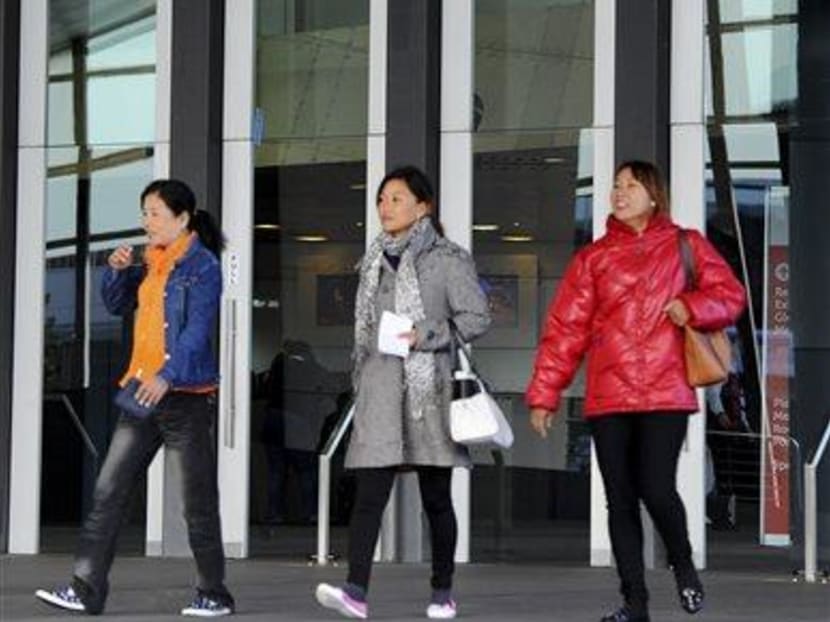AIDS conference attendees on downed Malaysian jet
SYDNEY — A large number of world-renowned AIDS researchers and activists heading to an international AIDS conference in Australia were on board a Malaysian jetliner that was shot down over Ukraine, officials said today (July 18), as news of their deaths sparked an outpouring of grief across the global scientific community.

People walk by the venue of the 20th International AIDS Conference in Melbourne. Australia, Friday, July 18, 2014. Photo: AP
SYDNEY — A large number of world-renowned AIDS researchers and activists heading to an international AIDS conference in Australia were on board a Malaysian jetliner that was shot down over Ukraine, officials said today (July 18), as news of their deaths sparked an outpouring of grief across the global scientific community.
There have been unconfirmed reports that up to 100 people on board the Boeing 777 were en route to the Victoria state capital of Melbourne to attend the 20th International AIDS conference, which starts Sunday, Victoria Premier Denis Napthine said, though he hastened to add that reports were conflicting and it was far too premature to give a precise figure.
“There’s been confirmed a number of senior people who were coming out here who were researchers, who were medical scientists, doctors, people who’ve been to the forefront of dealing with AIDS across the world,” Napthine told reporters in Melbourne. “The exact number is not yet known, but there is no doubt it’s a substantial number.”
The plane, which was flying from Amsterdam to Kuala Lumpur, Malaysia, crashed Thursday with 298 people on board. American intelligence authorities believe a surface-to-air missile brought the aircraft down but it was not yet clear who fired it.
At least 27 Australians were confirmed to be on board the plane, which was scheduled to continue flying to Australia after stopping in Kuala Lumpur, Australian Foreign Affairs Minister Julie Bishop told reporters in Brisbane.
Among the passengers was former president of the International AIDS Society Joep Lange, a well-known HIV researcher from the Netherlands, opposition leader Bill Shorten said in parliament.
“There are Australians who would have planned to be at the airport tomorrow night to greet friends and family — amongst them, some of the world’s leading AIDS experts,” Shorten said. “The cost of this will be felt in many parts of the world.”
Chris Beyrer, president-elect of the International AIDS Society, said if reports of Lange’s death were true, “then the HIV/AIDS movement has truly lost a giant.”
Nobel laureate Dr. Francoise Barre-Sinoussi, co-discoverer of the AIDS virus and president of the International AIDS Society, paid tribute to Lange in a speech in the Australian capital, Canberra.
“Joep was a wonderful person — a great professional ... but more than that, a wonderful human being,” she said. “If it is confirmed, it will be a terrible loss for all of us. I have no words, really, to try to express my sadness. I feel totally devastated.”
She later told reporters the conference would continue out of respect for the lives lost: “Because we know that it’s really what they would like us to do.”
Lange had been working on HIV since the earliest years of the epidemic, participating in clinical trials and research across the world, Barre-Sinoussi said. He had dedicated his life, she said, to “the benefit of mankind.”
Sharon Lewin, co-chair of the conference, called Lange a true renaissance man, who also had a keen interest in arts and literature.
“He was passionate about his job and passionate about global health and improving people’s lives in low-income countries,” Lewin said. “He was quite visionary actually, I think since the very early days of the epidemic and could see what the challenges were that lay ahead.”
Former U.S. President Bill Clinton will deliver an address at next week’s AIDS conference, which brings together thousands of scientists and activists from around the world to discuss the latest developments in HIV and AIDS research.
The World Health Organization’s Geneva-based spokesman Glenn Thomas, who was en route to the conference, was also among the dead, said Christian Lindmeier, spokesman for WHO’s Western Pacific region.
“Everybody’s devastated,” Lindmeier said. “It’s a real blow.”
Flags at government buildings across Victoria will be lowered to half-staff on Friday and will remain that way throughout the conference, the state premier said.
House of Representatives Speaker Bronwyn Bishop called for a moment of silence in parliament to honour the victims, adding that she was scheduled to address the AIDS conference on Monday.
“I know there will be many empty spots,” Bishop said. “And I think that what we’re doing is mourning with all of the world and all that had been lost. And we want to see justice but in a measured way.”
The International AIDS Society issued a statement expressing its grief over the news that several of its colleagues and friends were on board.
“At this incredibly sad and sensitive time the IAS stands with our international family and sends condolences to the loved ones of those who have been lost to this tragedy,” the group said. AP









